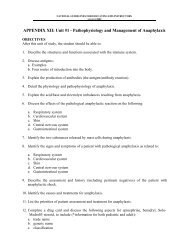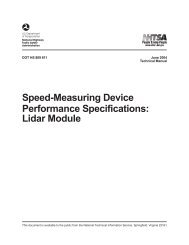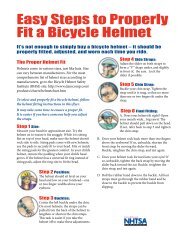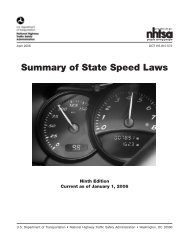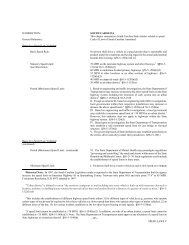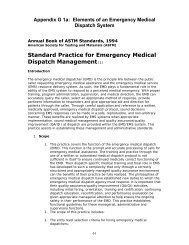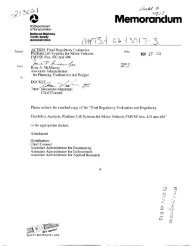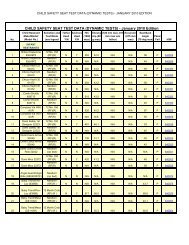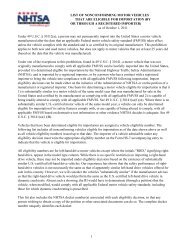The Criminal Justice System: A Guide for Law Enforcement ... - NHTSA
The Criminal Justice System: A Guide for Law Enforcement ... - NHTSA
The Criminal Justice System: A Guide for Law Enforcement ... - NHTSA
Create successful ePaper yourself
Turn your PDF publications into a flip-book with our unique Google optimized e-Paper software.
est way to make a good impression with the jury is to be courteous and<br />
professional. You were just doing your job during the arrest, and you do not have<br />
a personal stake in the case.<br />
13. Testify in straight<strong>for</strong>ward language. Do not say “<strong>The</strong> perpetrator exited the vehicle”<br />
when in reality “the defendant got out of his car.” <strong>The</strong> person on trial is never a<br />
“lady” or “gentleman,” but is always “the defendant.” Do not use military times<br />
without clarifying the time in layman’s terms. Do not use call signals. Your<br />
testimony makes more sense to the jury when you speak the same language they do.<br />
14. It is permissible and desirable to discuss the case with the prosecutor be<strong>for</strong>e trial.<br />
A defense attorney may ask this question; tell the truth. Obviously, a prosecutor<br />
will try to discuss the case with the witnesses be<strong>for</strong>e trial; be straight<strong>for</strong>ward in<br />
answering this question.<br />
15. A defense attorney will always ask whether you have an independent recollection<br />
of the case. That is, aside from your police report or other notes, do you remember<br />
the event? Any fact that you remember about the stop and/or arrest of the<br />
defendant would be sufficient to answer this question positively.<br />
Specific DWI Trial Recommendations<br />
1. Never give the numerical alco-sensor/PBT reading of the defendant when asked by<br />
the prosecutor. <strong>The</strong> answer to this question is whether the result was positive or not<br />
<strong>for</strong> the presence of alcohol. However, if the defense attorney asks you <strong>for</strong> the<br />
NUMERICAL reading, give it to him unless otherwise directed by the judge. It might<br />
be a good idea to ask the judge if it is okay to answer this be<strong>for</strong>e offering the number<br />
so as not to risk a mistrial.<br />
2. Always demonstrate how you conducted field sobriety evaluations. If the prosecutor<br />
<strong>for</strong>gets to ask you to come off the witness stand to demonstrate, suggest that it will aid<br />
your testimony. Be certain, however, that you can do in court all the evaluations you<br />
asked the defendant to per<strong>for</strong>m at the time of the arrest. Obviously, if you cannot do<br />
them, the jury will not expect the defendant to have done them properly.<br />
3. Know the reasons <strong>for</strong> giving field sobriety evaluations:<br />
• <strong>The</strong>y are divided attention tests, designed to detect when a person is<br />
impaired by alcohol and/or drugs.<br />
• <strong>The</strong>y provide evidence of intoxication in case the defendant refuses to take<br />
a State-administered test under implied consent.<br />
• <strong>The</strong>y prevent an arbitrary decision to arrest and allow an officer to<br />
articulate the reasons <strong>for</strong> concluding a driver was DWI to someone not<br />
present at the scene.<br />
13



